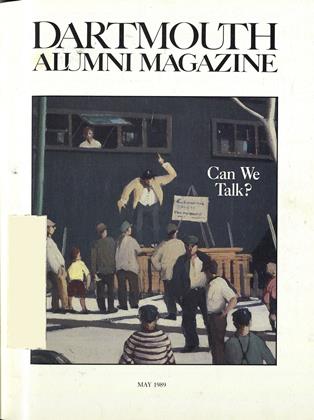The evil twin of campus debate.
How is it that one of the nation's top-rated schools can look so crazy in so many news stories? Maybe because some of what passes for debate at Dartmouth qualifies less as speech than as its evil twin, hype. With the help of the national media, a small group of extremists right and left take even the most trivial campus incidents and lift them into national controversy. The result is a weird dance between tiny campus minorities and sympathetic columnists.
You put your right foot in .. . The Dartmouth Review is ever-vigilant for signs of leftist venality, finding evidence even where it doesn't exist. A Review columnist recently claimed that officials had "cancelled" the Winter Carnival snow sculptureeventhough students had already built one.
You put your right foot out. . . Such tripe gets spread by a group of surprisingly gullible national columnists. Conservative writers are remarkably good at spotting Major National Trends out of covered-up windows and snowless winters.
You put your left foot in .. . Thanks to the small group of leftists at Dartmouth, the silliest piece of graffiti, the dumbest comment by an insecure freshman, is taken as the exposed nastiness of an evil society.
And you shake it all about . . . The national impression that results from all this leaping to conclusions is a national reputation—an unfair reputation—of weirdness and persecution. Journalist Larry Martz '54 points out in the following essay that the extremists' hyperbole creates an image of a college at war with itself. Hence the frequent phone calls that we editors get from alumni wanting to know what on earth is going on at this place.
What's going on, of course, is a superb, education for 4,000 of the nation's finest students. Most are too busy with their studies and their endless activities to worry about so-called campuswide debates. Undergraduates say professors rarely discuss personal politics in the classroom, let alone impose them on the students. Besides, any proselytizing has clearly failed: most Dartmouth students are as apoitical as their peers elsewhere.
This sang froid is not altogether good, according to Martz, who concludes his analysis of speech at Dartmouth with a call for the moderates to regain the public agenda. Free speech is not assured by merely tolerating extremism; Martz argues that when the fringes dominate debate they can inhibit speech in the middle. People fear getting sucked into the name-calling and countercharges of extremist "debate."
But for the past couple of years there has been a moderate voice: James O. Freedman, a constitutional scholar who has never spoken out against the Review without first confirming its right to publish freely. The personal attacks that have followed the president's statements show the risks that a moderate faces at Dartmouth when he goes public.
It was Freedman who calmed the campus down in the aftermath of the Cole incident; in the same week, he expressed his support for this magazine's decision to publish a series of advertisements by the right-wing Hopkins Institute, despite calls from the left to reject the ads. Although campus extremists and their media dancing partners might claim that both his speech and his defense of the magazine tainted campus freedoms, in fact Freedman has created badly needed room for reasoned debate.
You can reach your own conclusions from the articles that follow, whichlike everything else published under the current editorship—have suffered no administrative interference. Hype to the contrary.
Jay Heinrichs is the editor of this magazine.
 View Full Issue
View Full Issue
More From This Issue
-
 Feature
FeatureWhen Dialogue Turns to Diatribe
May 1989 By Larry Martz '54 -
 Feature
FeatureDartmouth's Competitive Niche
May 1989 By Mahlon Apgar IV '62 -
 Feature
FeatureLet's Start a Genuine Discussion About Our College
May 1989 By George Munroe '43 -
 Feature
FeatureStudents in a "Goldfish Bowl" Rise to Debate
May 1989 By Ron Lepinskas '89 -
 Article
ArticleREVIEW LOSES SUIT
May 1989 -
 Article
ArticleSTARSTRUCK
May 1989 By Gary Wegner
Jay Heinrichs
-
 Cover Story
Cover StoryPassing With A Roll Of The Dice
MARCH • 1987 By Jay Heinrichs -
 Article
ArticleStatement of Ownership
NOVEMBER • 1987 By JAY HEINRICHS -
 Cover Story
Cover StoryNow For The Hard Part
FEBRUARY 1991 By Jay Heinrichs -
 Article
ArticleA Poet in The Cosmos
NOVEMBER 1993 By Jay Heinrichs -
 Article
ArticleStatement of Ownership, Management and Circulation (required by 39 U.S.C. 3685).
December 1995 By JAY HEINRICHS -
 Cover Story
Cover StorySecond Nature
OCTOBER 1996 By Jay Heinrichs
Features
-
 Cover Story
Cover StoryWARNER BENTLEY BUST
MARCH | APRIL 2014 -
 Cover Story
Cover StoryDaughters of Dartmouth
NOVEMBER 1988 By Anne Bagamery '78 -
 Cover Story
Cover StoryDifferent Strokes
May/June 2002 By Brad Parks ’96 -
 Feature
FeatureChairman's Report
December 1960 By Donald F. Sawyer '21 -
 COVER STORY
COVER STORYThe World According To Rembert
JULY | AUGUST 2016 By Jennifer Wulff ’96 -
 Feature
FeatureNotebook
July/August 2007 By JOHN SHERMAN, JOHN SHERMAN

